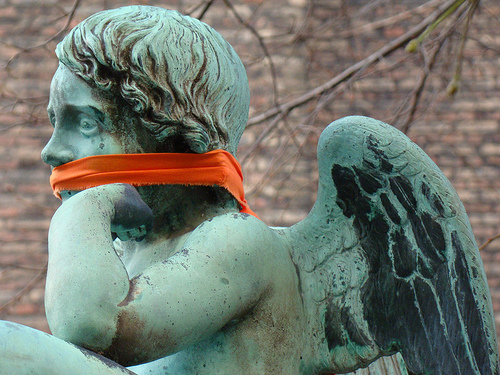Minnesota Gov. Mark Dayton signed an anti-bullying bill whose expansive provisions have raised concerns from lawmakers, parents, and school administrators over limiting free speech and vastly increasing school expenses and invasive data collection on children.
The Safe and Supportive Minnesota Schools Act is the “worst policy I have ever seen in my time here,” said state Rep. and Education Committee minority leader Sondra Erickson (R-Princeton).
The Minnesota Superintendents Association and Minnesota School Boards Association said the law is “overreaching,” “dangerous,” and an “unfunded mandate.”
The last Minnesota Student Survey, taken in 2010, shows students report less bullying in the state than in previous years, and that 93 percent of students feel safe at school.
Free-Speech Concerns
Now that the bill has passed, Minnesota students found exchanging any type of language which creates “a real or perceived imbalance of power” could end up in the principal’s office or counseled by a newly hired staff member who would be legally required to track such incidents.
The broad language states “prohibited conduct” includes discriminatory conduct based on a number of characteristics including race, ethnicity, color, sexual orientation, and gender identity and expression, adding, “prohibited conduct need not be based on any particular characteristic defined” but includes any conduct that is “objectively offensive” to another student.
The text of the bill insists it will not “interfere with a person’s rights of religious expression and free speech and expression under the First Amendment of the Unites States Constitution.”
On the contrary, said Hinckley-Finlayson Superintendent Rob Prater: “With the bill’s definition, bullying can be anytime anything makes someone feel bad.”
State Sen. Tony Lourey (DFL-Kerrick) says Minnesota doesn’t have enough anti-bullying laws on the books, and doesn’t think this bill would limit free speech.
“I have heard about the allegations of an indoctrination agenda, and I don’t see that myself. I think this comes down to where you are at and a choice of who you are,” he said.
Sex Education Controversy
The Minnesota Catholic Conference’s 2013-14 legislative platform says, “Combating bullying should never be a pretext to impose an agenda of groups of people, or to undermine the rights of parents to bestow their religious or moral values on their children.”
Advocates of alternative sexuality want to force their agenda on both public and private schools, Jason Adkins, the conference’s executive director, told the Pioneer Press. OutFront Minnesota, a LGBT group, was the bill’s most prominent advocate.
The law is “dangerous” and “about using the power of the legislature to control your children’s attitudes and values about human sexuality,” said Barb Anderson of the Minnesota Child Protection League to a crowd gathered in Hutchinson, Minnesota.
Don’t Tell Mom
An earlier version of the bill said parents would be notified of bullying incidents only “at the school administrator’s discretion” to “protect the target of the prohibited conduct.” The law includes a “presumption” that schools will notify parents of incidents.
“The state cannot simply legislate bullying out of schools,” said East Central School Superintendent Andrew Almos. “I would like to see the legislation be less prescriptive and allow school staff to focus on working with kids to improve the culture and climate in our schools. Initiatives are well underway in our local communities.”
He noted local programs such as Rachel’s Challenge have helped schools reduce bullying.
“My frustrations with this effort are focused mainly on the perception that schools do very little to prevent acts of bullying and hazing. This is simply not true. Schools day in and day out work to provide safe and supportive [environments],” Almos said.
Data-Collection and –Privacy Concerns
An early version of the bill would have required the state to publish annual “School Performance Report Cards” summarizing data on incidents of student bullying, cyberbullying, harassment, and intimidation and the remedial responses to the incidents. The bill also said Minnesota departments may share this data. This language was removed after protests from lawmakers and school leaders.
“I am not comfortable with taking this data about kids,” Prater said.
Erickson noted the rising incidence of data leaks, and she expressed worries a childish incident could influence kids’ futures, such as college admissions and job opportunities.
Another ‘Unfunded Mandate’
State Sen. Dan Hall (R-Burnsville) estimates the bill will cost $51 million over its first two years.
“How much will this cost, and who will pay for it? It is hard to know what this means, exactly, or how it will ultimately be implemented. In general, I believe that this is the wrong approach,” said Pine City Schools Superintendent Wayne Gilman.
Prater said this bill would make his district “take on another staff member” to deal with reports and investigate each situation, costing approximately $75,000 per year.
“This file seems punitive in nature and creates additional and unnecessary cost and labor for everyone,” Gilman said. “Matters of cyberbullying are not likely to be fixed by anything in this file, since cyberbullying can happen primarily outside school. This appears to be yet another unfunded mandate from the state.”
“This is a classic example of well-intentioned politicians in St. Paul not realizing the far-reaching implications of the bill that they passed and a case where they believe local officials can’t handle certain issues,” Hall said.
Image by Greg McMullen.




